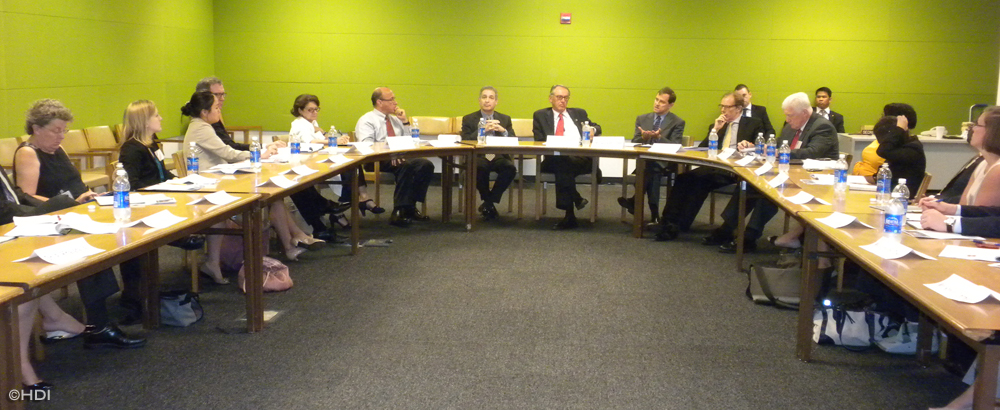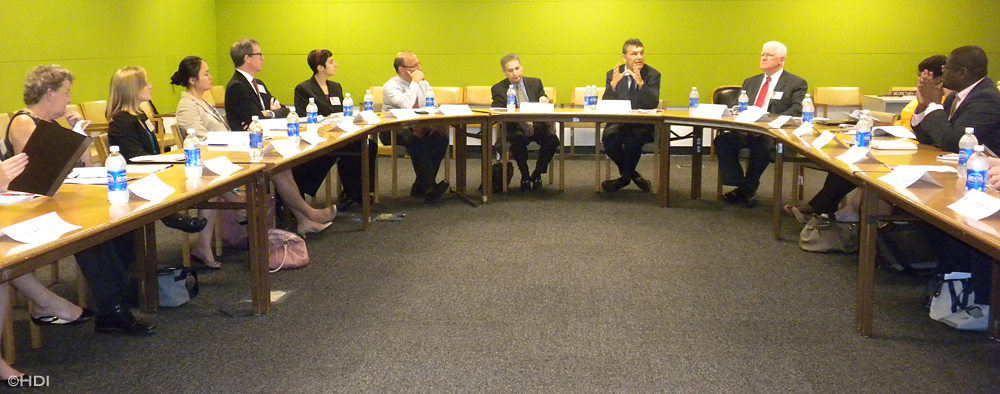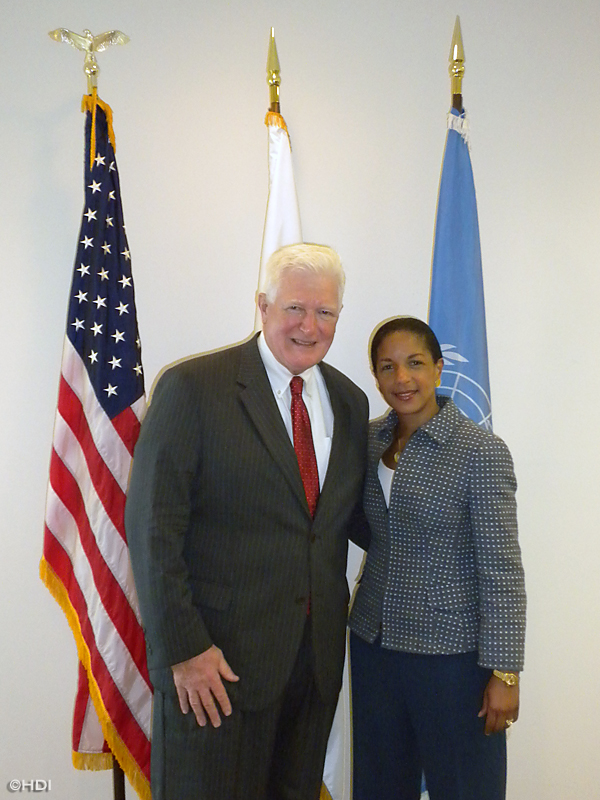The Humpty Dumpty Institute hosted its 42nd Congressional Delegation to the United Nations (see participant list) on Monday, August 6.
The delegation engaged in briefings concerning humanitarian intervention, food security, refugee assistance and border disputes in Sudan and South Sudan. It also explored the activities of the United Nations in dealing with the situation. The first event of the day was a working breakfast at which Deputy Permanent Representative of the Republic of South Sudan to the United Nations, Ambassador Francis George Nazario, and his legal counsel stressed the need to build strong political institutions, establish good relations with domestic and international governments, and work with the United States in reaching peaceful negotiations and security deals. The delegation was given a brief history of South Sudan’s relations with its northern neighbor and the investment hub it has become today since vast supplies of oil, minerals, and precious metals were discovered.
Following the breakfast, Philippe Lazzarini, Deputy Director of the Coordination and Response Division, United Nations Office for the Coordination of Humanitarian Affairs (OCHA), took the delegation through the numerous functions of his department. He emphasized bringing together U.N. agencies and NGOs to build a common understanding in solving the far reaching and encompassing problems in Sudan and South Sudan. Chief among these are the austerity measures put in place by the government of South Sudan following the shutting down of oil exports, which had accounted for 98% of the government budget. and the resulting spike in food and fuel prices. The delegation was also introduced to the Tripartite Initiative of the African Union, the League of Arab States and the United Nations for the delivery of humanitarian assistance to states of South Kordofan and Blue Nile.
The next briefing was given by Jan Eliasson, Deputy Secretary-General of the United Nations, Robert Orr, Assistant Secretary-General for Strategic Planning, and Andrew Gilmour, Director for Political, Humanitarian, Human Rights, and Peacekeeping Affairs in the office of the Secretary-General. The delegation was briefed on the U.N. Millennium Goals (MDGs), which include cutting rates of extreme poverty in half, providing universal primary education, promoting gender equality and stopping the spread of HIV/AIDS. The United Nations is working to achieve the MDGs by the target date of 2015 and is leading unprecedented efforts to meet the needs of the poorest. In addressing questions about the Sudan/South Sudan border conflict, the speakers focused on the issue of divisions within the Security Council as well as the requirement not to infringe on the rights of sovereign national governments.
Herve Ladsous, Under-Secretary-General for Peacekeeping Operations spoke to the delegation and explained how the current border clashes are making it difficult for the U.N. to respond to the humanitarian needs of displaced populations, especially those from South Kordofan and Blue Nile. Agriculture has been affected by armed clashes in the border areas, leading to poor harvests and restricting water supply. Ambassador Daffa-Alla Elhag Ali Osman, Permanent Representative of the Republic of the Sudan to the United Nations was the final speaker of the day and explained Sudan’s view on the problems that his country is facing with its southern neighbor. He blamed South Sudan for embezzling money and said that he believed the United States was too soft on South Sudan’s government. Jim Moran, U.S. Representative for Virginia’s 8th Congressional District, was frank in his reply and he stressed that many of his colleagues in Congress want to see an end to suffering and injustice in Sudan.
The participants then proceeded to a working lunch in the United Nations Delegates’ Dining Room with Ambassadors and other U.N. diplomats in attendance.
The final event of the day consisted of meetings at the U.S. Mission to the United Nations (USUN) with Ambassador Susan Rice, U.S. Permanent Representative to the United Nations and with Ambassador Elizabeth Cousens, U.S. Representative on the U.N. Economic and Social Council. USUN experts on Sudan and South Sudan presented the delegates with their interpretation of current events involving the two nations. Although the USUN view was optimistic, they emphasized that there is more to be done by the governments of Sudan and South Sudan in terms of political, economic and social cooperation and coexistence. The United Nations has an important role to oversee the process and promote rational solutions to existing issues.
Participants:
Representative James Moran, (D-VA)
Kemi Jemilohun, Legislative Director, Representative Karen Bass (D-CA)
Tom Garofalo, Legislative Assistant, Representative James Moran (D-VA)
Eric Williams, Democratic Staff Director, Africa, Global Health, Human Rights Subcommittee
Laure Fabrega, Senior Legislative Assistant, Representative Alcee L. Hastings (D-FL)
Christina Tsafoulias, Senior Legislative Assistant, Representative Michael E. Capuano(D-MA)
Elizabeth Darnall, Senior Legislative Assistant, Representative Carolyn B. Maloney(D-NY)
Jessica Lee, Legislative Assistant, Representative Jim McDermott (D-WA)
Nina Besser, Legislative Assistant, Representative Jan Schakowsky (D-IL)
Jason Lemons, Legislative Assistant, Representative Jim McDermott (D-WA)
Karen Smyth, Congressional Liaison, United Nations Information Center
Dianne Rennack, Congressional Research Service
Tom Andrews, former Congressman (ME)
Funding for this program has been provided by the United Nations Foundation
For more information, please contact Boris Shapoval at boris.shapoval@thehdi.orgAll Humpty Dumpty Institute’s organized Congressional travel is approved by the Ethics Offices of the U.S. House and the U.S. Senate and follows all guidelines for travel by USG employees as prescribed by U.S. Department of State regulations.




















